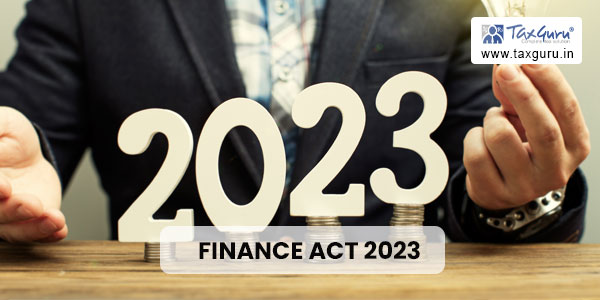Article explains What is Section 115BAC, Tax Rates under section 115BAC, Income computation for section 115BAC, Entry and exit from New Scheme and replies Frequently asked questions on Section 115BAC.
Page Contents
What is Section 115BAC?
Section 115BAC was introduced in Finance act 2020 as New Tax Regime whereby new tax rates were introduced for Individuals and HUF as an option to existing tax rates applicable. In this new regime, new tax rates are applied without giving certain deductions and exemptions as listed in the section. In this article we will do a detailed analysis of Section 115BAC as amended by Finance Act 2023. We shall be referring section 115BAC as new regime and normal slab rates applicable to Person (under 60 years, 60-80 years and above 80 years, all three slabs) as Old regime.
Tax Rates under section 115BAC
The tax rates applicable under new tax regime are as under:
|
₹ |
Rates |
|
0 – 3,00,000 |
0% |
|
3,00,001 – 6,00,000 |
5% |
|
6,00,001 – 9,00,000 |
10% |
| 9,00,001 – 12,00,000 |
15% |
| 12,00,001 – 15,00,000 |
20% |
| Above 15,00,000 |
30% |
These rates are amended by Finance Act 2023 whereby the basic exemption limit is raised from 2,50,000 to 3,00,000. Further, the section was erstwhile applicable to Individual and HUF only which now applies to Individual, HUF, AOP (other than co-operative societies) and BOI. This change has been brought to include more assessee for claiming benefit under the section.
The point to be noted here is that the slab rates available in Old Regime is differentiated for person aged below 60, aged between 60 to 80 and 80 above. In Old regime basic exemption limit is 2.50 lakhs, 3 lakhs and 5 lakhs respectively for mentioned categories. New tax regime does not makes any distinctions based on age or residential status thus basic exemption available to all shall be restricted to 3 lakhs only. So going by new regime, super senior citizen would loose on the benefit of extended basic exemption limit till 5 lakhs.
Furthermore, the section begins with Non obstante clause which overrules whole of the act but does not overrules Chapter XII (Section 110- 115BBG) (it also contains section 115BAC). Thus, if a person has income chargeable to tax under section 115BB (tax on winning of lotteries etc) choses to stay under Section 115BAC then the tax rates on winning from lotteries will be computed according to Section 115BB and not 115BAC.
Income computation for section 115BAC
This was about the tax rate applicable under Section 115BAC, now we shall discuss how income is computed for purpose of this section.
Now, the benefit of section could be availed by forgoing the deductions and exemptions listed herewith:
1. Leave Travel Allowance
2. House Rent Allowance
3. Rent Free Accommodation
4. Special allowance in nature of perquisite, granted to meet expenses related to duties: to the extent the expenses are actually incurred.
5. Special allowance granted to meet personal or to compensate cost of living expenses: to the extent prescribed under Rule 2BB.
6. Daily allowance received due to membership of Parliament or State Legislature
7. Minor child income allowance
8. Amount claimed as deduction u/s 10AA
9. Professional tax and entertainment tax
10. Loss under head house property, pertaining to self occupied or vacant property
11. Additional Depreciation
12. Deduction u/s 32AD/ 35CCC/ 35(1)(ii)/ 35(1)(iia)/ 35(1)(iii)/ 33AB/ 33ABA/ 35(2AA)
13. Chapter VI-A deduction except 80JJAA, 80CCD(2) and 80CCH(2) which include Life insurance premium, medical insurance premium, interest on saving bank account for non senior citizen, interest from deposit for senior citizen.
Thus, the income for purpose of Section 115BAC shall be computed without giving effect to above deductions and exemptions. This means one can avail any deductions or exemptions apart from above, such deductions are listed below:
1. Leave Encashment
2. Voluntary Retirement
3. Gratuity
4. Gifts from employer upto ₹ 5,000
5. Expense towards family pension which is equal to 1/3rd of pension received maximum ₹ 15,000
6. Loss under head house property on let out property, with a cap limit of ₹ 2 lakhs
Interestingly, where a person is continuing with Section 115BAC and having loss under head house property from self occupied property then such loss shall not be allowed but shall be deemed to be allowed and not carried forward to further years.

Entry and exit from New Scheme
Now having discussed about the rate of income tax and method of computation of income, next we shall discuss about entry and exit from new scheme.
One of the major changes made by Finance Act 2023 is that new regime is made default regime, which means anyone desirous of continuing with old regime then form needs to be filed in prescribed manner.
Such form needs to be filed on or before due date of filing of return u/s 139(1) for person having income under business or profession. This means 2 things
1. For claiming exit from new regime, one needs to file form on or before the due date of return.
2. The return may or may not be filed within due date u/s 139(1) but the form for moving to old scheme should be filed before due date.
However, for person not having income from business or profession the form needs to be filed along with return of income to be filed u/s 139(1). Thus here prerequisite is to file return u/s139(1), i.e., within due date.
Once such option is exercised by person having income under business or profession then it can be withdrawn only once. That means, the entry to new scheme is by default for all the persons but for the persons having income under business or profession, exit from the scheme can be made only once. Once exit is made from new scheme then this exit can be withdrawn only once that means re-entry can be made. But after such re-entry, no change can be done.
For person not having income from business or profession, the entry and exit option can be exercised anytime while filing return of income.
Frequently asked questions on Section 115BAC
1. Person having salaried income (no income under business profession) has declared to the employer for continuing with old regime. At the time of filing income u/s 139(1), he wants to switch to old regime. Can this be done?
- Yes, at the time of filing of return of income u/s 139(1) one may change to old scheme. The TDS credit of new scheme can be claimed in old scheme
2. As per the Finance Act 2021, section 194P exempted senior citizen (aged 75 or above) from filing of income tax return. Where such senior citizen want to opt for old regime, can he still continue to not file return?
- As per Section 194P specified senior citizen are not required to file ITR on fulfilment on conditions specified therein. In case senior citizen want to claim benefit of old regime then he need to exercise the option by filing prescribed form u/s 115BAC. Thus this necessitates him to file ITR. Technically a clarification is required from government regarding the same so that senior citizen can claim benefit of Sect 194P
3. A person having income from business or profession in AY 2024-25 and switches to old regime. He continues business till AY 2026-27 and shuts the same on 31.03.2026. In AY 2027-28 he is having no business or profession (filing ITR 1) and switches to new regime, in AY 2028-29 he starts new business. Will he be taxed under old regime or new?
- In this regard clarification with examples is required from the government/ department for clear interpretation.






I have income from Business or consultants for one month and salary thereafter for 11 months . which option is applicable for me – old regime or new regime. I have filed return under old regime by changing to old regime while filing. Is it defective
I have Income from business or profession for one month and thereafter salary income for next eleven month. Which regime should be applicable for me- Old or New in AY 2024-25
can ;you please post the form meant for exercising th option to move to the old regime from the default new regime??
If you are salaried individual then your employer will ask you whether you want to opt for old tax regime or continue in default regime. Employer is bound to collect this information. If you are not salaried then you can opt for old regime in your ITR when you file it. There is no separate form for this